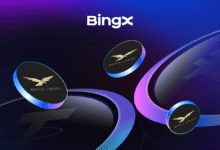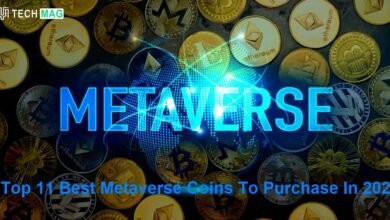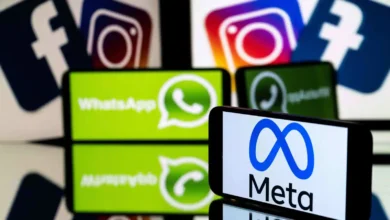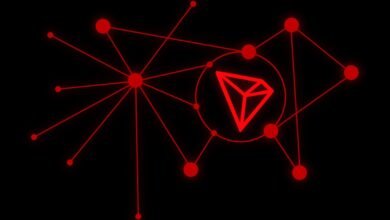NFTs and Digital Art in Pakistan: Opportunities for Local Artists and Collectors
Discover NFT opportunities for Pakistani artists & collectors. Learn blockchain art creation, marketplaces, success stories & digital art trends.
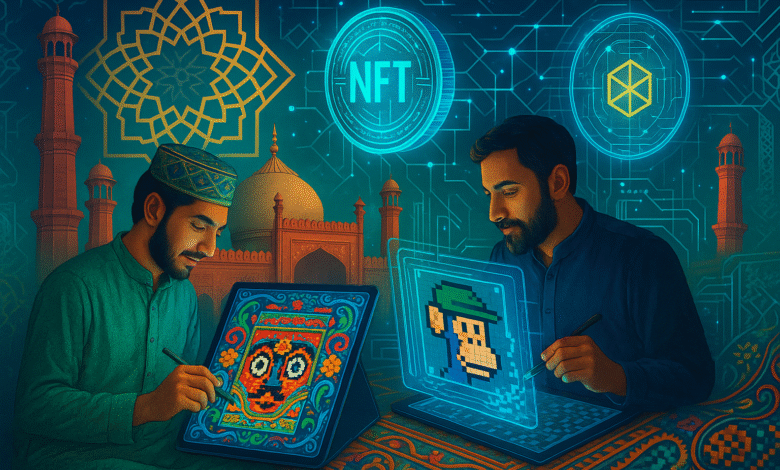
The digital revolution has transformed the global art landscape, and Pakistan is emerging as a significant player in the NFT (Non-Fungible Token) and digital art ecosystem. As blockchain technology continues to reshape creative industries worldwide, Pakistani artists and collectors are discovering unprecedented opportunities to monetize digital creativity, preserve cultural heritage, and participate in the global digital economy.
NFTs and digital art in Pakistan represent more than just a technological trend—they symbolize a cultural renaissance that bridges traditional artistic expression with cutting-edge digital innovation. This comprehensive exploration examines the current state, opportunities, challenges, and future prospects of the NFT ecosystem in Pakistan.
Understanding NFTs and Their Impact on Digital Art
Non-Fungible Tokens have revolutionized how we perceive, create, and trade digital art. These unique digital certificates, powered by blockchain technology, provide proof of ownership and authenticity for digital assets. Unlike traditional art forms, NFTs enable artists to retain royalties from secondary sales, creating sustainable income streams that were previously impossible in the digital realm.
The concept of digital ownership through NFTs has particular significance in Pakistan, where artistic traditions span millennia. From ancient Gandhara sculptures to contemporary digital installations, Pakistani artists are now able to tokenize their work and reach global audiences without traditional gatekeepers or intermediaries.
Digital art encompasses various forms including illustrations, animations, 3D models, virtual reality experiences, and generative art. Pakistani creators are exploring all these mediums, often incorporating traditional motifs, calligraphy, and cultural symbols into their digital masterpieces.
The Current Landscape of NFTs and Digital Art in Pakistan
Pakistan’s digital art scene has experienced remarkable growth over the past few years. Young artists, particularly those based in major cities like Karachi, Lahore, and Islamabad, are increasingly turning to digital platforms to showcase their work. The country’s growing internet penetration and smartphone adoption have created fertile ground for digital art consumption and creation.
Several Pakistani artists have gained international recognition through NFT marketplaces. Artists like Hassan Rab, who incorporates traditional Islamic patterns into contemporary digital art, and Shehzil Malik, known for her vibrant digital illustrations celebrating Pakistani culture, have successfully monetized their work through blockchain platforms.
The Pakistani NFT community has grown organically through social media platforms, particularly Twitter and Discord, where artists share their work, collaborate on projects, and educate newcomers about blockchain technology. This grassroots movement has fostered a supportive ecosystem that encourages experimentation and innovation.
Local galleries and art institutions are beginning to recognize the potential of digital art and NFTs. The Canvas Gallery in Karachi and VM Art Gallery in Lahore have hosted exhibitions featuring digital art, signaling growing institutional acceptance of these new art forms.
Opportunities for Pakistani Artists in the NFT Space
Global Market Access
One of the most significant advantages of NFTs and digital art in Pakistan is the ability for local artists to access global markets without geographical limitations. Traditional art markets often require physical presence, gallery representation, or expensive international shipping. NFTs eliminate these barriers, allowing Pakistani artists to sell directly to collectors worldwide.
The global NFT market, valued at several billion dollars, offers Pakistani artists unprecedented earning potential. Artists can price their work in cryptocurrencies, often earning more than they would through traditional local sales. This global accessibility has already enabled several Pakistani creators to build international followings and achieve financial independence through their art.
Cultural Preservation and Promotion
Pakistani artists are uniquely positioned to introduce global audiences to the rich cultural heritage of South Asia through digital art. Traditional patterns, architectural elements, historical narratives, and contemporary social issues can be preserved and promoted through NFTs. This cultural export potential not only benefits individual artists but also enhances Pakistan’s soft power globally.
Artists are creating digital collections that celebrate Pakistani festivals, showcase traditional crafts like truck art and tile work, and document disappearing cultural practices. These efforts contribute to cultural preservation while generating economic value for creators.
Royalty Mechanisms
Unlike traditional art sales where artists typically receive payment only once, NFTs enable creators to earn royalties from every subsequent sale. This revolutionary feature means that successful Pakistani artists can build long-term passive income streams as their work appreciates in value and changes hands in secondary markets.
The royalty system is particularly beneficial for emerging artists who may initially sell their work at lower prices but can benefit from appreciation over time. This mechanism provides financial security and incentivizes artists to continue creating high-quality work.
Community Building and Collaboration
The NFT ecosystem encourages community building and collaboration among artists. Pakistani creators are forming collectives, participating in collaborative projects, and supporting each other’s work through cross-promotion and mentorship. These communities provide valuable resources for learning about blockchain technology, marketing strategies, and artistic techniques.
Collaborative projects between Pakistani and international artists are becoming increasingly common, fostering cultural exchange and artistic innovation. These partnerships often result in unique hybrid artworks that combine different cultural perspectives and artistic styles.
Opportunities for Collectors in Pakistan
Accessible Art Investment
NFTs have democratized art collecting by making it more accessible to a broader audience. Pakistani collectors no longer need significant capital to start building art collections. Many NFTs are priced affordably, allowing middle-class collectors to participate in the art market for the first time.
Digital art collecting also eliminates concerns about storage, insurance, and physical deterioration that traditional art collecting entails. Collectors can build extensive digital galleries without physical space constraints.
Supporting Local Artists
Pakistani collectors have the opportunity to directly support local artists and contribute to the growth of the domestic digital art scene. By purchasing NFTs from Pakistani creators, collectors can help establish a sustainable ecosystem that benefits the entire community.
Early support for emerging Pakistani artists can also prove financially rewarding as these artists gain international recognition and their work appreciates in value.
Portfolio Diversification
For investors and collectors looking to diversify their portfolios, NFTs offer a new asset class with unique characteristics. While traditional investments may be subject to local economic conditions, NFTs operate in a global market and can provide exposure to international trends and demands.
The speculative nature of some NFT investments also appeals to collectors who enjoy the excitement of discovering undervalued artists and participating in a rapidly evolving market.
Challenges and Barriers in the Pakistani NFT Market
Technical Infrastructure
Despite growing internet penetration, Pakistan still faces challenges related to technical infrastructure. Inconsistent internet connectivity, limited access to high-speed broadband in rural areas, and frequent power outages can hinder digital art creation and NFT trading activities.
The complexity of blockchain technology and cryptocurrency wallets also presents barriers for less tech-savvy artists and collectors. Educational initiatives and user-friendly platforms are essential to overcome these challenges.
Regulatory Uncertainty
Pakistan’s regulatory framework for cryptocurrencies and blockchain technology remains unclear and evolving. The State Bank of Pakistan has issued various statements regarding cryptocurrency trading, but comprehensive regulations specifically addressing NFTs are still being developed.
This regulatory uncertainty creates challenges for artists and collectors who may be hesitant to fully embrace NFT trading without clear legal guidelines. Clarification from regulatory authorities would provide much-needed confidence to market participants.
Limited Local Platform Development
While Pakistani artists can access international NFT marketplaces, the lack of locally developed platforms presents challenges. International platforms may not cater specifically to Pakistani artists’ needs or cultural contexts. Local platforms could offer features like Urdu language support, local payment methods, and curated collections focused on Pakistani art.
Educational Gaps
Many talented Pakistani artists lack knowledge about blockchain technology, cryptocurrency wallets, and NFT creation processes. Similarly, potential collectors may not understand how to purchase, store, and trade NFTs safely. Bridging these educational gaps is crucial for market growth.
Economic Barriers
While NFTs can provide new income streams, the initial costs associated with creating and listing NFTs (including gas fees and platform charges) can be prohibitive for some artists. Additionally, the volatility of cryptocurrency markets can make pricing and financial planning challenging.
Success Stories of Pakistani NFT Artists
Hassan Rab: Bridging Traditional and Digital Art
Hassan Rab has emerged as one of Pakistan’s most successful NFT artists by incorporating traditional Islamic geometric patterns into contemporary digital art. His collections have sold for substantial amounts on international platforms, demonstrating the global appeal of Pakistani cultural motifs when presented through modern digital mediums.
Rab’s success illustrates how Pakistani artists can leverage their cultural heritage to create unique value propositions in the global NFT market. His work resonates with both local and international collectors who appreciate the sophisticated blend of tradition and innovation.
Shehzil Malik: Celebrating Pakistani Culture
Shehzil Malik’s vibrant digital illustrations celebrating Pakistani culture, food, and traditions have gained international recognition through NFT platforms. Her work demonstrates how contemporary social media aesthetics can be successfully translated into valuable digital collectibles.
Malik’s approach shows how Pakistani artists can tap into diaspora communities and international audiences interested in South Asian culture. Her success has inspired many other Pakistani artists to explore NFT creation.
Collaborative Projects
Several Pakistani artists have participated in international collaborative NFT projects, contributing unique perspectives and artistic styles. These collaborations have helped raise the profile of Pakistani digital art globally and created valuable networking opportunities for local creators.
Major NFT Marketplaces for Pakistani Artists
OpenSea
OpenSea remains the largest and most accessible NFT marketplace for Pakistani artists. The platform’s user-friendly interface and broad reach make it an ideal starting point for creators entering the NFT space. Many successful Pakistani artists have built their initial followings through OpenSea.
Foundation
Foundation’s curated approach appeals to serious artists and collectors looking for high-quality digital art. Several Pakistani artists have successfully listed their work on Foundation, often achieving higher average sale prices due to the platform’s selective curation process.
SuperRare
SuperRare’s focus on single-edition digital artworks aligns well with traditional art collecting practices. Pakistani artists creating unique, museum-quality digital pieces often find success on this platform.
Async Art
For Pakistani artists interested in programmable art and dynamic NFTs, Async Art offers innovative features that allow for evolving and interactive artworks. This platform is particularly suitable for technically sophisticated artists exploring the boundaries of digital art.
Creating and Selling NFTs: A Guide for Pakistani Artists
Technical Requirements
Creating NFTs requires basic technical knowledge and access to specific tools. Artists need digital wallets (like MetaMask), sufficient cryptocurrency to pay for minting fees, and high-quality digital artwork files. Understanding blockchain networks (primarily Ethereum and Polygon) is essential for successful NFT creation.
Artistic Considerations
Successful NFT art often incorporates elements that work well in digital formats. High resolution, vibrant colors, and intricate details tend to perform well. Pakistani artists should consider how their traditional artistic influences can be adapted for digital consumption while maintaining authenticity.
Marketing and Community Building
Building a following on social media platforms, particularly Twitter and Instagram, is crucial for NFT success. Pakistani artists should engage with the global NFT community while also connecting with local collectors and fellow creators.
Pricing Strategies
Pricing NFTs requires careful consideration of factors including the artist’s reputation, artwork quality, rarity, and market conditions. New Pakistani artists often start with lower prices to build collections and reputation before gradually increasing their prices.
Also Read: The NFT Artwork of the Future and Beyond, by NFT Maker
Collecting NFTs: A Guide for Pakistani Enthusiasts
Setting Up Digital Wallets
Collectors need to set up cryptocurrency wallets and acquire the necessary cryptocurrencies (usually Ethereum) to purchase NFTs. Understanding wallet security and backup procedures is essential to protect digital assets.
Research and Due Diligence
Successful collecting requires research into artists, project roadmaps, and market trends. Pakistani collectors should focus on building knowledge about both local and international artists whose work resonates with their interests and investment goals.
Storage and Security
NFT collectors must understand how to safely store their digital assets and protect against scams and fraudulent projects. Learning about cold storage options and security best practices is essential for serious collectors.
The Role of Blockchain Technology in Pakistani Art
Blockchain technology provides the foundation for NFTs and offers several benefits for Pakistani artists and collectors. The immutable nature of blockchain records provides permanent proof of ownership and authenticity, addressing long-standing issues in the art world related to forgery and provenance.
Smart contracts automate royalty payments and ensure that artists continue to benefit from their work’s success over time. This feature is particularly valuable for Pakistani artists who may have limited access to traditional art market infrastructure.
The decentralized nature of blockchain networks means that Pakistani artists are not dependent on local institutions or intermediaries to participate in the global art market. This independence is especially valuable in emerging markets where traditional art infrastructure may be limited.
Government Initiatives and Support
While Pakistan’s government has not yet implemented comprehensive NFT-specific policies, there is growing recognition of the potential of blockchain technology and digital assets. The State Bank of Pakistan and other regulatory bodies are working to develop frameworks that balance innovation with consumer protection.
Educational institutions in Pakistan are beginning to offer courses on blockchain technology and digital arts, helping to build the technical skills necessary for NFT creation and trading. Universities like LUMS and NUST are incorporating blockchain studies into their curricula.
Future Prospects and Trends
The future of NFTs and digital art in Pakistan looks promising, with several trends indicating continued growth and development. Increasing smartphone penetration and improved internet infrastructure will make digital art creation and consumption more accessible to artists and collectors across the country.
The integration of augmented reality (AR) and virtual reality (VR) technologies with NFTs opens new possibilities for immersive art experiences. Pakistani artists exploring these technologies could create unique value propositions in the global market.
The development of local NFT platforms tailored to Pakistani artists and collectors could significantly boost domestic market growth. Such platforms could offer local language support, regional payment methods, and curated collections focused on Pakistani culture and art.
Corporate adoption of NFTs for marketing and brand building presents opportunities for Pakistani artists to collaborate with businesses on commercial projects. As companies increasingly explore Web3 strategies, demand for local digital art talent is likely to grow.
Conclusion
NFTs and digital art in Pakistan represent a transformative opportunity for artists and collectors to participate in the global digital economy while celebrating and preserving local culture. Despite challenges related to infrastructure, regulation, and education, the potential benefits far outweigh the obstacles.
Pakistani artists have already demonstrated their ability to create compelling digital art that resonates with international audiences. As the ecosystem continues to mature, we can expect to see increased participation from both creators and collectors, leading to a vibrant and sustainable NFT market in Pakistan.
The key to success lies in continued education, community building, and adaptation to evolving technologies and market conditions. By embracing these new opportunities while staying true to their cultural roots, Pakistani artists and collectors can build a thriving digital art ecosystem that benefits the entire creative community.
The convergence of traditional Pakistani artistic heritage with cutting-edge blockchain technology creates unique possibilities for cultural expression and economic empowerment. As the world becomes increasingly digital, Pakistan’s participation in the NFT and digital art revolution will play a crucial role in shaping the country’s creative and economic future.
